John McDonnell MP
International Social Forum
International Social Forum 13th & 14th at SOAS university of London, 10 Thornhaugh St, Bloomsbury, London WC1H 0XG
Over recent months we have witnessed startling scenes across the globe that have prompted many more to question how we can address the issues facing our planet.
Tens of thousands of children in country after country walked out their schools and thousands of others mobilised in demonstrations under the banner of Extinction Rebellion to demand action to tackle the existential threat of climate change.
People in their masses continue to cram onto dinghies and small vessels or climb border fences, migrating to seek safety or a life out of poverty.
Economists and politicians have also increasingly been exposing the growing power of the multinationals, especially the new data corporations, whose influence and financial clout exceed individual nation states, and which enable them to avoid their tax responsibilities.
The challenges the world is now facing require transnational actions and global solutions.
Existing global institutions, designed and established in the twentieth century, are proving to be incapable of responding effectively to these threats.
A new international architecture is needed if we are to face the global challenges of the twenty first century.
Labour convened this international social forum bringing together politicians, economists and social movement leaders from across the world to launch a new dialogue on the reform of the international institutional architecture to rise to these critical challenges and prepare a programme of reform.
Opening Plenary
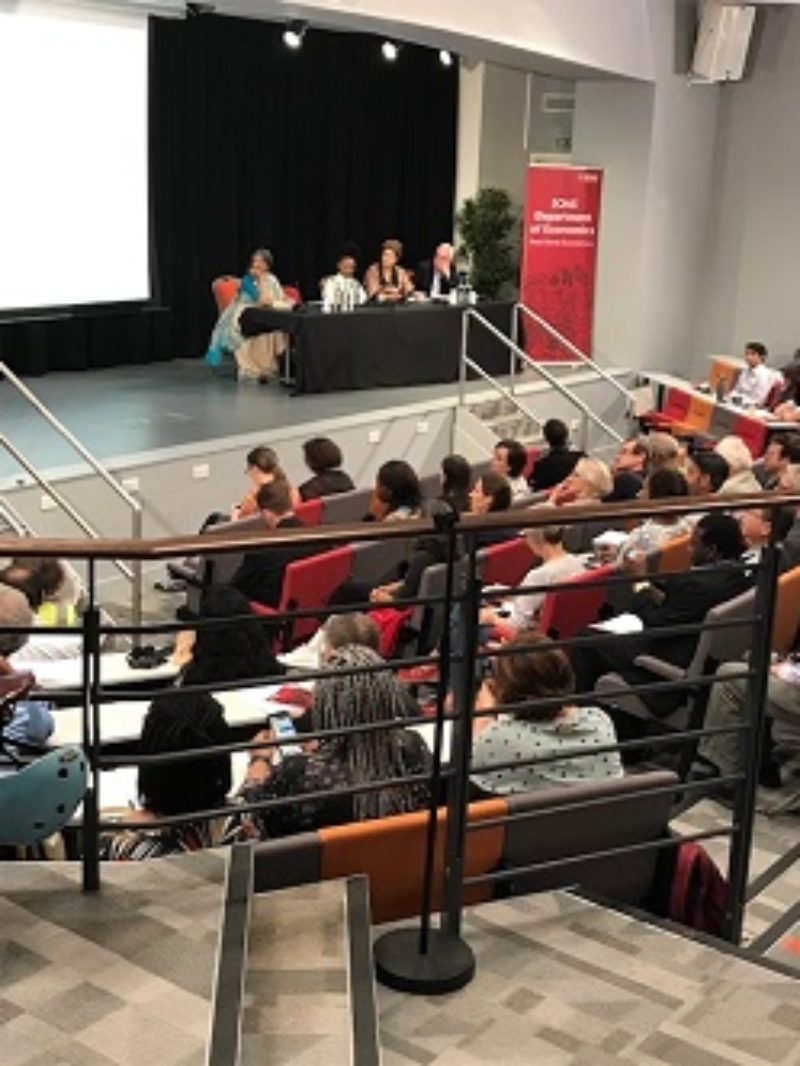
John McDonnell MP
Shadow Chancellor of the Exchequer
Dilma Rousseff
Brazilian economist and former President of Brazil.
Jayati Ghosh
Development economist and Professor of Economics at Jawaharlal Nehru University, New Delhi.
Naledi Chirwa
Economic Freedom Fighters representative in the South African National Assembly.
Costas Lapavitsas
Professor of Economics, School of Oriental and African Studies, University of London
The Opening Plenary can be viewed here
Climate Crisis Plenary
As UN Secretary General António Guterres has said, climate change is an “existential threat to humanity.” Radical multilateral action is needed on climate mitigation, to limit planetary warming to 1.5°C, as well as in adapting to climate change that has already happened and managing its worst effects.
The 2015 Paris Treaty, a binding agreement to limit emissions to the level necessary to keep global warming “to well below 2 °C above pre-industrial levels and to pursue efforts to limit the temperature increase to 1.5 °C.”, was signed by 197 countries and ratified by 185 as of January 2019. However, it has a number of weaknesses, reflecting polluter countries’ unwillingness to agree to anything stronger. Perhaps most notably, even if all countries met their self-determined Nationally Determined Contributions, we would still see warming of approximately 3°C. The “bottom up” nature of the Paris Agreement (non-binding targets, self-policing of performance) – while welcomed by commentators as an “innovative” feature of international law that enabled most countries to ratify – in fact represented a failure of multilateralism, which had been weakened by GW Bush’s withdrawal from the Kyoto Protocol, the failure of the Copenhagen COP, and the promotion of misinformation about the reality, scale and urgency of the climate crisis by fossil fuel companies. A key question concerns how progressive countries can work in and around this fragmented multilateral system.
Furthermore, all EU countries have fallen behind on their targets and President Trump has pledged to pull the USA out of the Agreement. In October 2018, the UN Intergovernmental Panel on Climate Change published a report setting out the severe effects of failing to keep planetary warming with 1.5 °C. One set of questions therefore concerns the strength and ambition of international agreements. How can commitment and agreement be achieved on an international scale? What is needed to ensure that treaties are met?
A second set of questions concerns the nature and scale of action needed. We are past the point where piecemeal actions will do. Addressing environmental challenges will require the deployment of enormous levels of resources at both national and international levels, as well as coordination in how this is done. International institutions have tended to promote market-based solutions to climate change, such as emissions trading. Recently we have seen a drive to push market-based solutions to achieving the Sustainable Development Goals. Yet, as Nick Stern has said, climate change is “a result of the greatest market failure the world has seen.” How, then, does the economic theory and logic underpinning the international coordination of planning and delivery of mitigation and adaptation need rethinking? On what basis or through what mechanisms should financial, technical and other resources be allocated across countries?
All of this must be addressed through a lens that recognises that climate change is rife with international injustices. Climate change is the outcome of decades of unsustainable development from the world’s richer countries, yet it does not respect borders. It is the least polluting countries, more often than not the developing nations, at the sharp end of climate change chaos – fuelling food insecurity and social dislocation. People living in the Global South (in particular, indigenous peoples) are already being hit from decreasing rainfall and increase in extreme weather events linked to climate change and entire regions, such as the Caribbean, continue to be intensely vulnerable to climate-related disasters. The third key area for consideration is therefore how to ensure that countries’ international obligations are in line with their respective capacities and responsibilities, recognising, in particular, that there is no correlation between those most culpable for causing climate change and those worst affected by it.
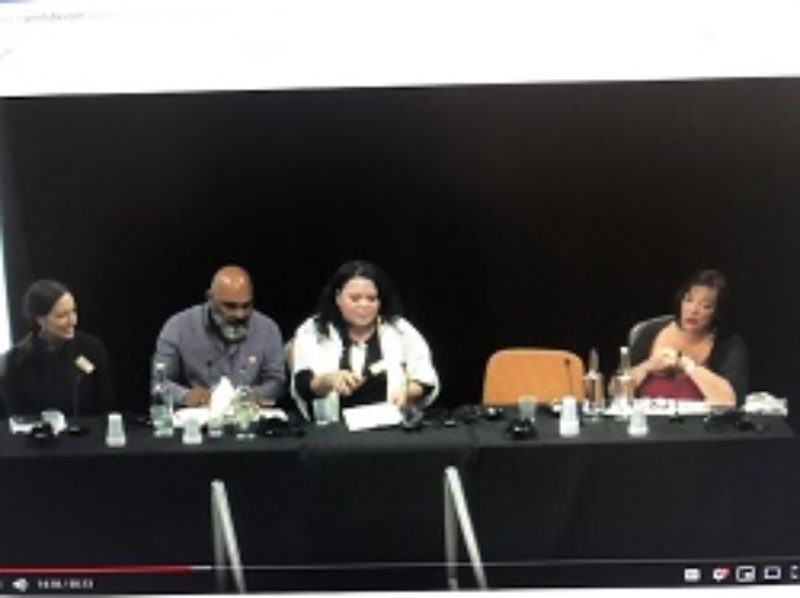
Chair:
Lyn Brown MP
Shadow Treasury Minister with a Responsibility for Social Mobility.
Holly Buck
UCLA Institute of the Environment and Sustainability
Asad Rehman
War on Want’s Executive Director.
Tina Ngata
Leading New Zealand activist, Te Wānanga o Aotearoa
The Climate Crisis Plenary can be viewed here
Workshops
The Forum included a series of interactive workshops after each plenary that allowed attendees to share their ideas and engage with participants from the UK and around the world.
Global Finance and Accountability Plenary
The focus of this session was on the global financial system. Since the collapse of the post-war Bretton Woods settlement, institutions such as the World Bank and International Monetary Fund have sought to redefine their roles. This session looked at what roles our governments play in relation to these global financial institutions and whether they are capable of tackling the economic problems the world faces.
This plenary covered topics such as: the role of the finance sector in the global economy, the rise of multinational corporations; the power of global institutions over domestic economic policies, and the links between international institutions and the privatisation of infrastructure. Specifically the question of taxation – tax havens and how to tax footloose capital (both personal and corporate) – was also addressed.
Speakers elaborated on how existing problems arise from or are related to the current institutional arrangements. There was also a discussion on the sort of features a redesigned international financial system might have, and what the prospects are for achieving this by reforming the existing institutions as opposed to the need for establishing new ones.
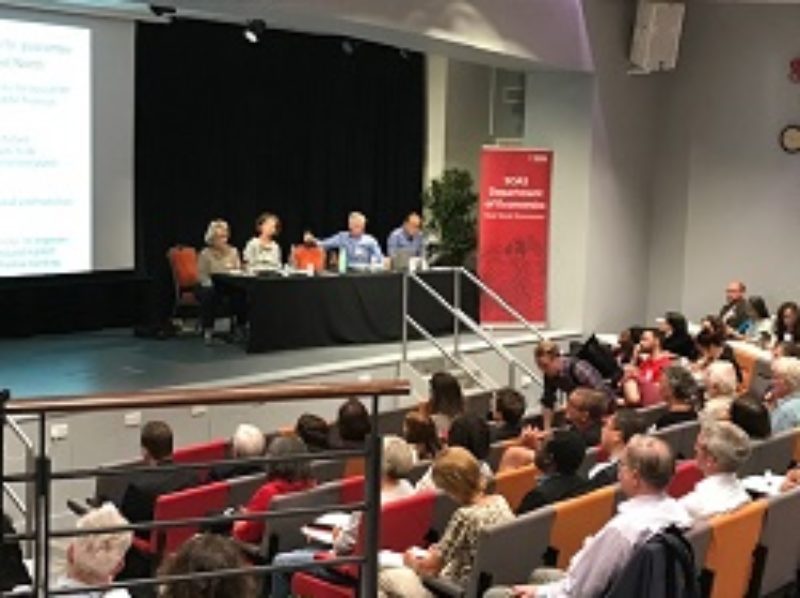
Chair
Anneliese Dodds MP
Shadow Financial Secretary to the Treasury.
Daniela Gabor
University of the West of England
John Christiansen
Tax Justice Network
Kavaljit Singh
Public Interest Research Centre, New Delhi
Ann Pettifor
Policy Research in Macroeconomics (PRIME)
The Global Finance and Accountability Plenary can be viewed here
Sunday
Movement of People Plenary
According to UNHCR, there are currently almost 70m people worldwide who are forcibly displaced from their homes – the highest number since the Second World War. Of these, more than 25m are formally recognised as refugees, more than two-thirds from just five countries: Syria (6.3m), Afghanistan (2.6m), South Sudan (2.4m), Myanmar (1.2m) and Somalia (986,000).
Over time, the prevailing view in many of the world’s wealthiest countries has been that too much inward immigration is bad – or at best a necessary evil to be tolerated in the pursuit of economic growth. Many countries in Europe, the continent with the smallest global share of refugees and migrants, have increasingly formulated migration policies through a security lens.
This is an agenda driven by the rise of the far right. It has led many governments to not only abandon their moral but also their legal obligations under the 1951 Refugee Convention and 1967 Protocol to provide safety and protection for refugees fleeing conflict and persecution.
Global developments:
- Following two years of negotiations, UN member states formally adopted two ‘Global Compacts’ – one on migration and one for refugees – in mid-December, among other things attempting to strengthen adherence to global norms regarding the treatment of refugees, share responsibility for refugees more equitably, and address the root causes of refugee crises, such as instability and violent conflict.
- However, the compacts are not legally binding and are weak on specific proposals, and we must press for more specific proposals and concrete commitments to action, particularly in three areas:
– On the more equitable distribution of re-settlement;
– On funding requirements across different crisis situations; and
– On tackling the root causes of refugee crises and mass global migration trends.
This plenary covered topics such as: the global refugee crisis, the UK’s role in colonisation and present-day responsibilities, the Labour Party’s historical approach to the movement of people, global migration trends, the strong links between migration and labour, the neoliberal world order which has increased conflict over resources and the far right’s anti-immigration agenda. Speakers elaborated on the current debate on the movement of people and how we build a progressive agenda to provide protection for refugees and meet the needs of migrants in search for economic justice and dignity.
Labour policy on movement of people: Refugees and Migration
- Labour supports the two UN Global Compacts on migration and refugees
Migration
- Labour is committed to honouring all its legal and moral obligations to non-EU migrants, many of whom are from the Commonwealth. We will not be rewriting the immigration rules, which successive governments have done every few years, in order to retrospectively exclude people who previously had the right to come here.
- Labour rejects arbitrary and unworkable numerical immigration targets. The ‘tens of thousands’ target has never been met, and non-EU migration alone far outstrips it. It was based on no evidence or analysis, but plucked out of the air. Its actual purpose is to allow permanent campaign against migrants and immigration in general.
- Labour is calling out attacks on foreigners and migrants. Labour has no intention of scapegoating migrants. Like the Windrush Generation, migrants come to the United Kingdomto make a positive contribution to this society, economically, socially, culturally – in every way imaginable.
Refugees
- In December at the United Nations Geneva headquarters, Jeremy Corbyn, set out the four greatest threats to our common humanity. He said, “the refugee crisis was one of the greatest moral tests of our time”, demanding a new approach based on international cooperation and human rights.
- Refugees are not migrants. They have been forced from their homes, by war, famine or other disasters. Unlike the Tories, we will uphold the proud British tradition of honouring the spirit of international law and our moral obligations by taking our fair share of refugees.
- In the first 100 days of government Labour will publish a cross departmental strategy to meet our international obligations on the refugee crisis.
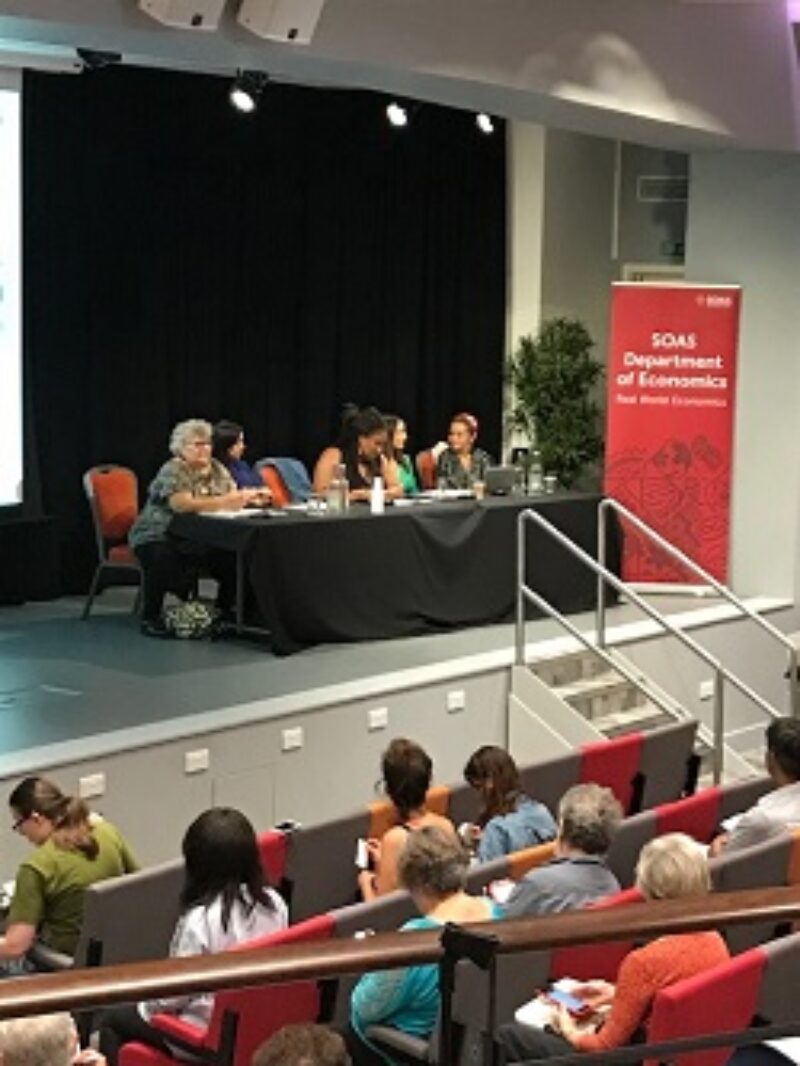
Maya Goodfellow
Writer and researcher on politics, immigration, gender and race
Sue Lukes
Islington councillor who is ‘Migrants’ Champion’ for the borough
Rafeef Ziadah
SOAS University of London
Dalia Gebrial
LSE student and writer on race and class from an international perspective, decolonisation and migrants’ rights
Movement of People Plenary can be viewed here
Trade/Protectionism Plenary
This session was the final subject-specific plenary before the closing plenary. It dissected some of the shortcomings of the international institutional framework for trade, and began to explore alternative institutional arrangements.
Speakers engaged with the multilateral institutional framework. In particular, they discussed their views on the World Trade Organisation. Should the current crisis facing the Appellate Body of the WTO prompt a broader rethink about the structure, role, and practices of an international trading organisation? Are the WTO’s rules fit for purpose, in particular in relation to tackling global inequality and the climate emergency?
Speakers also discussed so-called ‘free trade agreements’ at the bilateral or regional level. Do these agreements do enough to protect regulatory space and the need for active industrial policy? Could these agreements be redesigned so that more robust action might be taken globally on tax avoidance, climate change, and other social goals? What should the UK, and other countries’, approach be to Investor-State Dispute Settlement?
Further discussion points included what current geopolitical developments mean for the state of global trade. What lessons should be drawn from ongoing tensions in trade between the US and China? What do developments in the EU, including a possibly imminent Brexit, mean for trade in Europe and beyond? Why is Africa marginalised in so many conversations about trade and how can this be reversed? How should the UK, and a UK Labour Government, position itself amidst these developments?
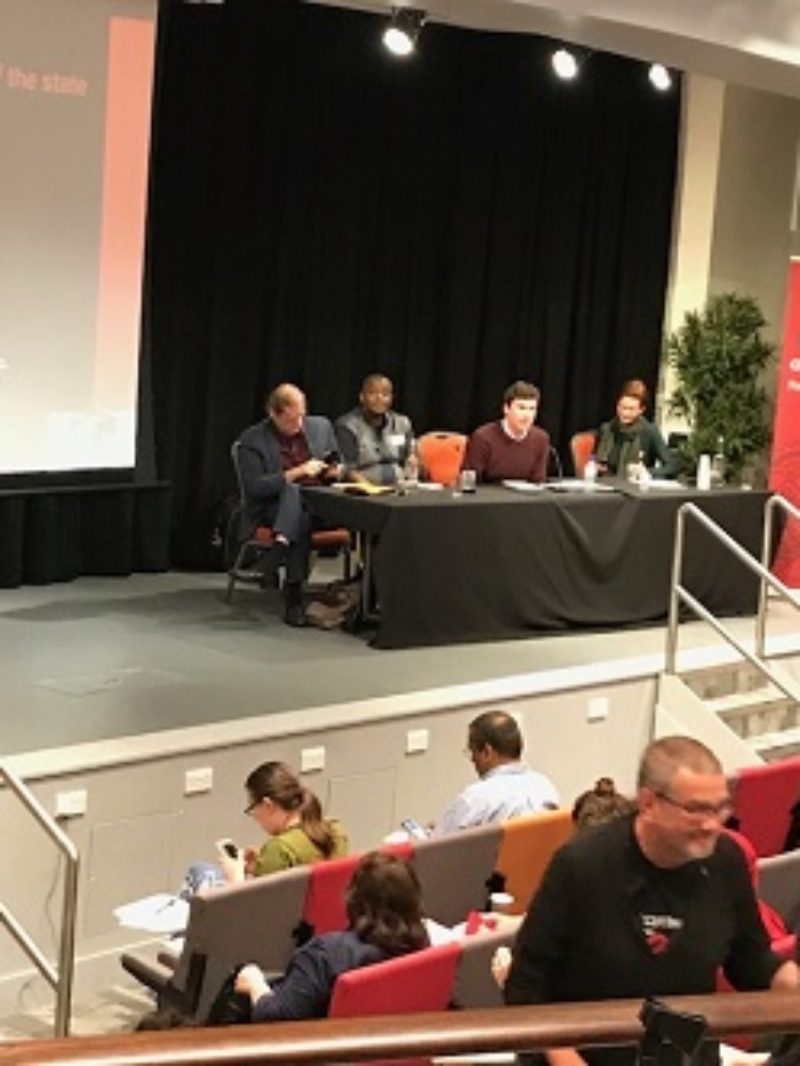
Chair:
Dan Carden MP
Acting Shadow Secretary of State for International Development.
Richard Kozul-Wright
United Nations Conference on Trade and Development (UNCTAD
Fiona Tregenna
University of Johannesburg
Gyekye Tanoh
Third World Network-Africa
Trade/Protectionism Plenary can be viewed here
Closing Plenary
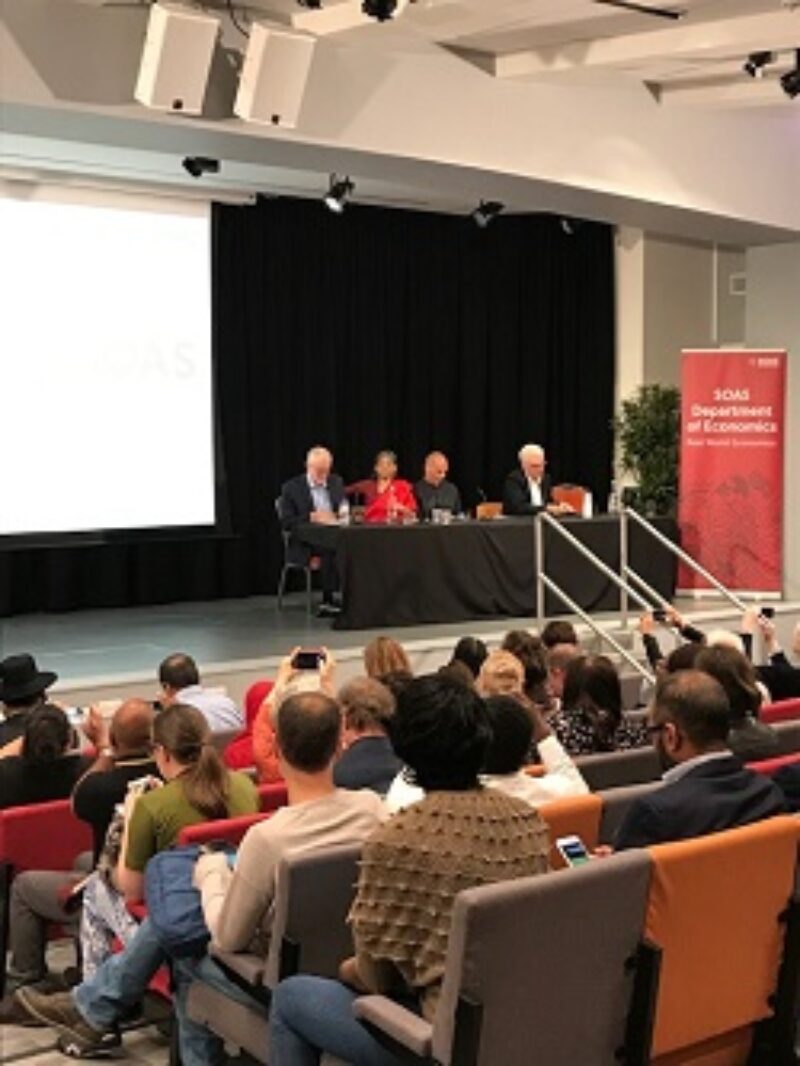
Jeremy Corbyn MP
Leader of the Labour Party
Jayati Ghosh
Jawaharlal Nehru University, New Delhi
Yanis Varoufakis
Co-founder, DiEM25, and leader of MeRA25
John McDonnell MP
Shadow Chancellor of the Exchequer
Next Steps
The purpose of this weekend was to test the water about whether we could launch an initiative which looked at the critical issues that we were facing and the critique that we had of the global and international arrangements that we currently have to tackle those issues.
Over the next 12 months we will:
- Prepare a report from the discussions this weekend.
- Identify the issues and analysis that have been brought forward and identify the issues we now need to address.
- Look at the structures that we can bring people together around those particular issues.
- Formulate recommendations as to whether we reform or replace some of the international and global architecture that we have, and
- Identify where the gaps are that we need to fill.
Closing Plenary can be viewed here
